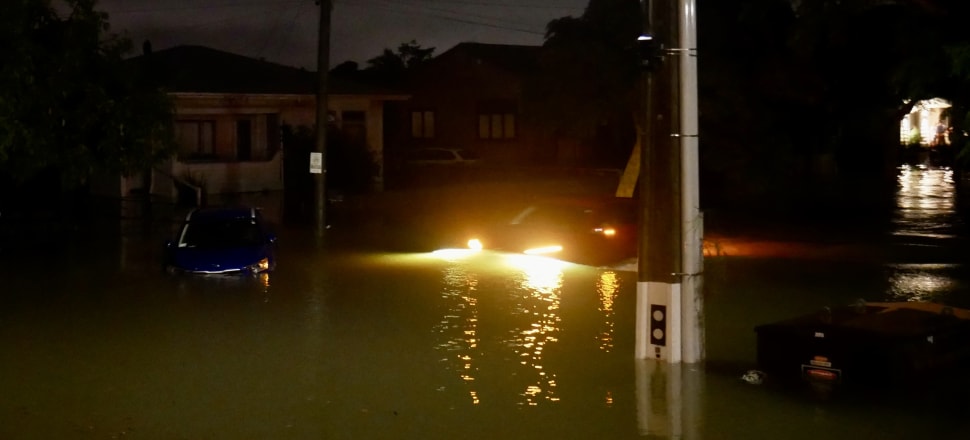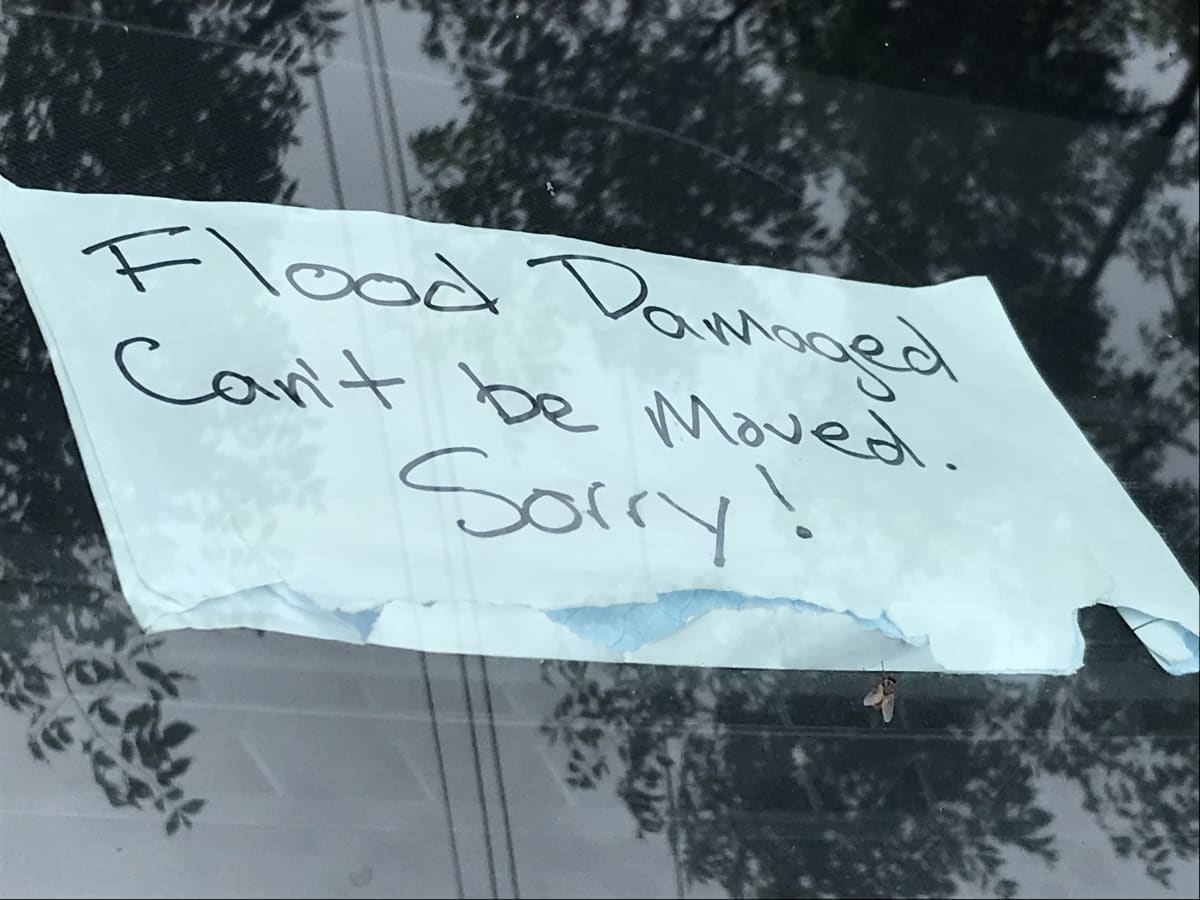
Someone left the Swift out in the rain - insurance agents are overloaded with calls about flood-damaged vehicles
It’s been a big week for testing the submarining abilities of the family station wagon.
Thousands of cars around the upper North Island have been written off following the devastating floods of last week.
And with one in five Kiwis without car insurance, that represents a destabilising financial blow for many families still trying to dry off from an unprecedented week of unwelcome and impromptu suburban lakes and ponds.
Meanwhile in Auckland, where most of the damage occurred, only 77 percent of people have insurance on their vehicle, according to data from Finder.
As the waters rose above the wheel level of many cars parked across the city, the cost of repairing the vehicle rose with it - in thousands of cases until it was above the market value of the vehicle.
Insurers have been inundated with claims as people try to put their soggy lives back together.
Insurance companies have received more than 13,000 claims in the week since the floods, with Tower saying it had received more than 500 vehicle claims.
Meanwhile, IAG - the owners of State, AMI and NZI - is dealing with more than 200 vehicle claims a day.
IAG told investors it expects to pay out almost $400 million in claims, including on home and contents insurance policies.
Over the weekend, AA Insurance reported it has either settled or made an offer to settle close to 60 percent of a record 1500 vehicle claims since the flooding - the largest event in the companies history when it comes to motor claims.
Head of motor claims Beau Paproa said the company was writing off most flood-damaged vehicles.
"We know that losing a vehicle can impact heavily on our customers' lives - disrupting their ability to get to work, drop kids off at school or childcare, and other family commitments," he said. "Due to the nature of the flooding, we are assessing most flood-damaged vehicles as a total loss - which means we can settle these claims quickly and get money to our customers' hands, so they can move fast to source a replacement vehicle and get back on the road."
Paparoa said this approach will also help customers get back on the road before another potential challenge on the horizon – the ongoing supply chain issues for motor vehicles, which could further impact the availability of vehicles for purchase over the coming months.
Claim numbers for AA Insurance are expected to rise further over the coming weeks.
A car salesperson at a Toyota dealership said he had already had around ten people come through to replace wet vehicles, and reported that it seemed insurance companies were being lenient with people making claims, perhaps in order to make sure they can get through an immense workload.
Flooded streets across Auckland last weekend played host to many motorists putting their vehicles to the test and taking the big risk of fording murky and deep waters.
Other vehicles parked in harm’s way waited as the water rose up and started pouring through into the vulnerable engine, electronics and fittings.

But nowadays there are two distinct types of car out on the streets of the city - petrol and electric.
While videos of Teslas foolishly crossing flooded roads abound online, one vehicle assessor said she had seen both electric and combustion engine vehicles written off this week.
“Once the water gets into the engine and the electronics, there will almost always be problems down the road,” she said.
So while electric vehicles may not have the problem of hydro-locking - when water floods the cylinder and causes the pistons to seize, potentially causing massive engine damage - that doesn’t make them totally flood-proof.
Richard Edwards is an editor for EVs & Beyond Magazine - a trade with a particular focus on the future of the automobile industry.
He said while electric vehicles had an innate advantage getting through water due to the lack of an exhaust pipe and the batteries being sealed in the car, that didn’t make it a good idea to take your Nissan Leaf for a swim.
“Water damage is a broad thing,” he said. “By and large there's actually an innate advantage to getting through water - although I’m not suggesting anybody should use their EV to run around in floods.”
EVs have the advantage of not needing to drink air to keep on going, but water in the inverter or the controls can still pose a problem.
Edwards said he expected the number of EV insurance claims to echo the percentage of the EV ownership out of all car ownership.
It’s a question that will become more relevant as EV ownership continues to increase, and should weather events like last weekend's prove to be more common in the future, as climate scientists suggest.
Following Hurricane Ian ravaging Florida in September of last year, there were reports of 11 electric vehicle batteries catching fire after drying out.
Submersion in salt water and physical damage to the batteries during the hurricane was thought to have corroded the batteries, leading to short circuits producing flames even firefighters found difficult to put out.
But Edwards points out it was a very different situation in Auckland, without the corrosion of salt water playing as much of a part and without the overall increased turbulence of a full-on tropical hurricane.
Instead, Auckland EVs sat in a bit of floodwater - it may not have been great for the upholstery, but it's unlikely to have begun corroding the battery pack.
It should also be noted that any and every vehicle relies on some form of energy to get it moving, and that energy tends to be vulnerable to ignition.
Aside from the glucose-derived people power pushing the pedals on a bicycle, vehicles tend to contain concentrated power sources that have the potential to ignite.
That goes for batteries, but is certainly a more prescient fact for the petroleum and diesel tanks located within combustion engine vehicles.
Nevertheless, floodwaters are less likely to cause fuel tanks to go up than a salt-corroded electrical circuit.
Newsroom asked Fire and Emergency New Zealand whether there had been any cases of fire from electric vehicles in New Zealand.
A spokesperson from the organisation said they did not have data on this, as FENZ data currently didn't distinguish between electric and petrol car fires.
Paul Turner, FENZ national manager of response capability, said hybrid and electric vehicles were specifically designed to be safe, even when under water.
“However, an electric vehicle that has been submerged in water, particularly salt water, has a higher risk of experiencing a battery short circuit, which may result in a battery fire.”
Turner said firefighters were trained to understand what to do when coming into contact with an electric vehicle submerged in water.
“Similarly, firefighters learn about the difference between petrol and diesel, and hybrid and electric vehicles, and the considerations when one of these vehicles is in an accident or on fire.”
So it’s largely unclear whether you’re better off with an electric or combustion vehicle when the streets flood.
It may even be clearer which you are better off with if you’d like to play a part in reducing the frequency of events like this in the future, however - the one pumping out less carbon dioxide.
Edwards said there were a few other factors that made him glad to be an EV advocate once the rains hit.
“My brother-in-law had one of my vehicles and he got stuck for like six hours trying to head down to the airport,” he said. “While he was bouncing round trying to find a way down, he spent much of that time sitting in the car waiting to get through slips and that.”
For the same reason an EV copes well with the start-stop nature of Auckland traffic, Edwards said his brother-in-law didn’t have to worry about burning through a tank of fuel while waiting in a queue of cars.
Back at home, Edwards had his own peace of mind bolstered by the EV in the garage, which he said when plugged into his power board could run his household for a week with mindful power usage.
Edwards said personally-owned car batteries could be a path towards greater power security, especially in times like these floods.
Distributed batteries plugged into the main grid could also help share the load of current moments of heavy usage, like after work on a Friday.
“The broader value of EVs needs to be seen,” he said. “When it comes to resilience, there are so many potential benefits.”
But when it comes to flooding, it seems the EV owners are just as likely to be lining up for their insurance check.







